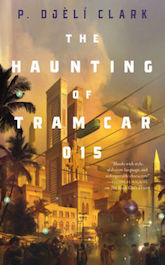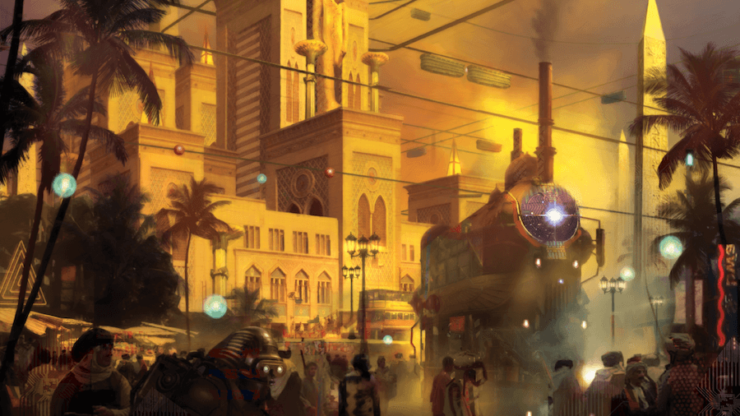On the eve of one of the country’s most important votes in years, a spirit takes over a tram car. Agent Hamed Nasr has been at the ministry for a long time, too long perhaps. He’s seen just about everything. Joining him is a fresh recruit, Agent Onsi Youssef, an eager, learned young man. What starts off as a standard exorcism explodes into the unimaginable. This is no ordinary haunting, and to solve the case Hamed and Onsi will have to make some unexpected alliances in the city’s underbelly.
For years now, P. Djèlí Clark has quietly been cranking out short fiction that is as fantastical as it is attuned to social justice. Through captivating characters unlike any we’ve ever seen before and sumptuous worldbuilding that twists the familiar into something exciting and new, Clark works his own magic. Back in 2016, Tor.com published his novelette “A Dead Djinn in Cairo,” a supernatural murder mystery set in an alternate Cairo. With The Haunting of Tram Car 015, Clark expands on his “Dead Djinn” world here with masterful effect. Agent Fatma el-Sha’arawi and Siti from “Dead Djinn” both make appearances in here, but the main protagonists here are Hamed and Onsi.
The early twentieth century Cairo of Haunting isn’t the Cairo you’re familiar with. In this alternate steampunk-ish 1912, djinn and angels and necromancers and mystics share the city with opinionated citizens and agents from the Ministry of Alchemy, Enchantments, and Supernatural Entities. With the discovery of magic in the late nineteenth century, Egypt burst on the world stage as a major power player, driving out imperial threats and thriving on fantastical innovations. Airships and trolleys ferry Cairenes to and from neighborhoods of new money, magical beings, and hardworking immigrants. Country bumpkins and those longing for more freedom and educational and employment opportunities flow in from far flung regions as the metropolis expands and evolves.
However, while advancements in technology, aided in large part by the djinn and their supernatural ilk, have made Egypt a place of wonders, society is still catching up. All that’s about to change if women’s suffrage is passed. For years, women activists have been pushing for equal rights. Now with the backing of the queen and a groundswell of support, they have a real chance to win. But victory is not guaranteed. The old ways of restrictions and limitations based on gender are hard to shake and many are unwilling to accept women in pant suits, much less gaining equal rights.
It’s this complicated world that Hamed and Onsi live in. They are modernists who aren’t afraid of the future, but middle-aged Hamed perceives those changes differently than young Onsi. Onsi is young enough to still be unjaded. He’s ambitious and inquisitive enough want to try the unorthodox but remains respectful of the past. Hamed isn’t rigid or conservative, but he’s had years of the old ways and it isn’t always easy to keep an open mind about the wild antics of kids these days.
If Hamed straddles the line between the future and the past, Clark cleverly places the women characters (with one key exception) on the side of the future and the men (other than Hamed an Onsi) on the side of the past. It’s not that men are bad and women are good but more that men in a patriarchal society often feel they have something to lose when women gain rights. They don’t, but in a world built upon a foundation of oppressors and oppressed, those on top typically either dismiss the push for equity as a silly fantasy or try to reframe it in the context of a hierarchy. Through Hamed, Onsi, and Abla, Clark resists not just the notion that equity demands sacrifice and subtraction but that enlightenment requires Westernization.
Buy the Book


The Haunting of Tram Car 015
As much as I love the idea of steampunk, I often have a hard time with the subgenre because it tends to if not outright glorify then simply ignore colonialism and imperialism. Without the Victorian era, you don’t get steampunk, but you also don’t get the Victorian era without the brutality, exploitation, desecration, and destruction of imperialism. It’s easy to set aside what Queen Victoria was doing to her colonies if all you care about are airships and goggles on top hats. Clark uses the British invasion of 1882 as a springboard—the newly arrived djinn helped repel the imperialists—then takes it one step further. Often, in both fiction and non-fiction, a society isn’t deemed “civilized” until they adopt Western rules, including those regulating the subservience of the conquered by the conquerors.
In Haunting, Clark shifts the focus from the British to the Egyptians. Agent el-Sha’arawi wears English menswear because to her the attire is exotic and unusual—she is, in fact, turning the imperialists’ obsession with exoticism against them. Abla explores the themes of immigration and migration by bridging the chasm between ancient beliefs and contemporary traditions. The djinn, angels, and other supernatural entities use their knowledge and gifts to benefit Egypt and prevent further invasion from Westerners. Cairo develops according to its own goals, needs, and socio-cultural interests with no influence from the Western world. In young adult science fiction and fantasy, the trend of POC authors deconstructing colonialism has been gaining traction recently, but it is still fairly uncommon in adult SFF. Here’s hoping Clark is only the tip of the iceberg.
If last year’s stellar novella The Black God’s Drum hadn’t already solidified P. Djèlí Clark as one of the best under-the-radar writers today, The Haunting of Tram Car 015 will. In just over 100 pages filled with monstrous creatures and fanciful magic, Clark critiques the patriarchy, imperialism, and Westernization under the guise of a slight plot about a haunted public transit trolley. This book should be on every recommendation list of the best fantasy fiction for 2019. I can’t wait to see what he writes next.
The Haunting of Tram Car 015 is available from Tor.com Publishing.
Read an excerpt from the novella here. You can also read “A Dead Djinn in Cairo,” a story set in the same world.
Alex Brown is a high school librarian by day, local historian by night, author and writer by passion, and an ace/aro Black woman all the time. Keep up with her on Twitter and Insta, or follow along with her reading adventures on her blog.










